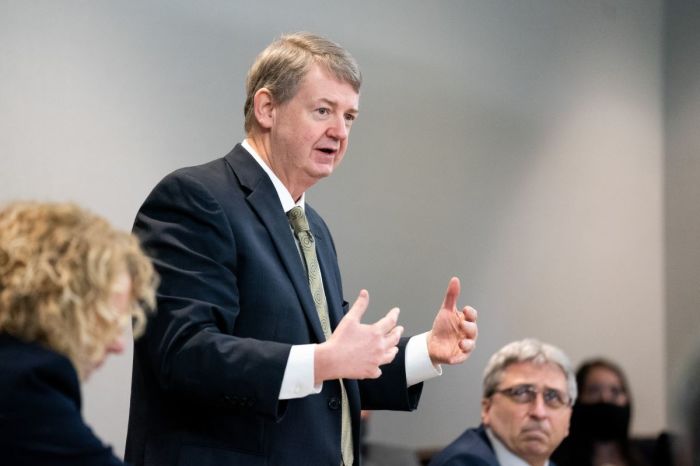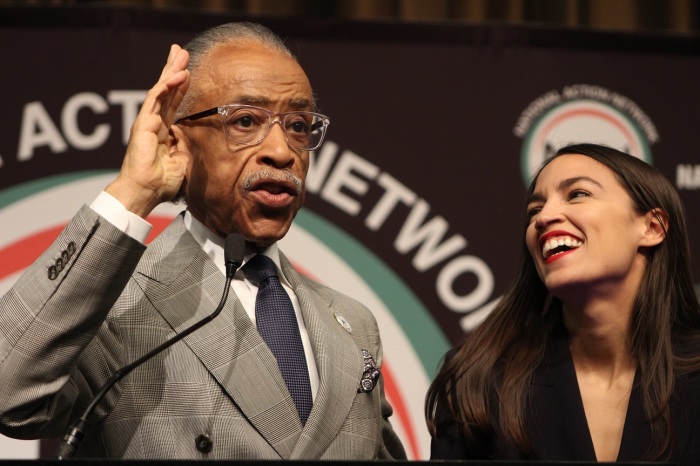Defense attorney in Ahmaud Arbery trial doesn't want any more black pastors in courtroom

Kevin Gough, an attorney for one of three white men standing trial for the 2020 killing of 25-year-old unarmed black man Ahmaud Arbery in Georgia, lashed out against the presence of high-profile members of the black community attending the trial Thursday, saying in court, “we don’t want any more black pastors coming in here.”
While noting he had no problems with civil rights leaders like The Rev. Al Sharpton, he argued that Sharpton’s presence or the presence of other high profile black ministers like The Rev. Jesse Jackson Sr. in the courtroom could “consciously or unconsciously … pressure or influence the jury” against his client.
His client, William “Roddie” Bryan Jr, is being tried for Arbery’s murder, along with the father-son duo of 65-year-old Gregory McMichael and 35-year-old Travis McMichael. Arbery was fatally shot while jogging in Glynn County on February 23, 2020.
“I’m guessing he [Sharpton] was there [at the back of the courtroom on Wednesday] at the invitation of the victims’ family in this case. I have nothing personal against Mr. Sharpton,” Gough told the judge before raising concern about the presence of “high profile members of the African American community in the courtroom.”
“If we’re going to start a precedent that started yesterday, we’re going to bring high profile members of the African American community in the courtroom to sit with the family during the trial in the presence of the jury. I believe that’s intimidating, and it’s an attempt to pressure — could be consciously or unconsciously — an attempt to pressure or influence the jury,” Gough argued. “To my knowledge, Rev. Sharpton has no church in Glynn County. He never has.”
The lawyer then added: “We don’t want any more black pastors coming in here or other — Jesse Jackson, whoever was in here earlier this week — sitting with the victim’s family trying to influence a jury in this case.”
Judge Timothy Walmsley of the Georgia Superior Court Eastern Judicial Circuit said he had no objections to Sharpton being in the courtroom as long as his rules are being followed and the proceedings aren’t disrupted.

In a statement Thursday, Sharpton called Gough’s comments “arrogant insensitivity.”
“The arrogant insensitivity of attorney Kevin Gough in asking a judge to bar me or any minister of the family’s choice underscores the disregard for the value of the human life lost and the grieving of a family in need [of] spiritual and community support,” Sharpton said.
“My attendance yesterday [Wednesday] and in the days to come is not disruptive in any way and was at the invitation of the family of Ahmaud Arbery, who have stated that publicly. The only way I could have been identified as a member of the ministry is if I was recognized for my public position and leadership. How else would the defense attorney know who was a ‘black pastor' or not?” he asked.
“This objection was clearly pointed at me and a disregard to the fact that a mother [and] father sitting in a courtroom with three men that murdered their son do not deserve the right to have someone present to give spiritual strength to bear this pain. This is pouring salt into their wounds,” Sharpton added. “I respect the defense attorney doing his job, but this is beyond defending your client. It is insulting the family of the victim.”
Black pastor and prominent progressive activist The Rev. William J. Barber II was also in Brunswick for trial Thursday. He told CNN that he left a member of his organization there to be with the family and called Sharpton to have additional ministers come down in the coming days.
“He can say whatever he wants to,” Barber said of Gough’s comments. “He has to understand, for me, I’m not a minister; I’m a pastor first. I pastor people. I’ve had to go to families when they’ve had people killed and I sit in courtrooms.”
He further challenged Gough’s claim that the jury could be intimidated by the presence of the black activist pastors, arguing instead that the attorney is “intimidated by the truth.”
“This is ultimately about the truth and to suggest that we are the intimidating ones when this case is about white men who were riding around with guns ... shooting an unarmed black man ... it just shows how disjointed this case is,” Barber contends. “Truth is intimidating for people who want to run a lie.”




























